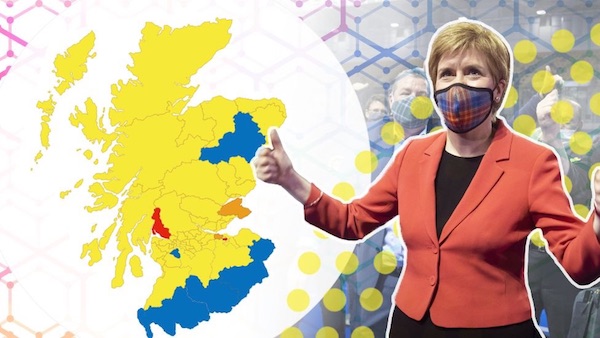
Following a landslide vote for her party in national elections, Scottish First Minister Nicola Sturgeon has declared “it is the will of the country” for Scotland to have a second independence referendum.
After all counts were declared last weekend, the SNP ended on 64 seats, while the Tories had 31, Labour were on 22, the Scottish Greens had 8 and the Lib Dems 4. That meant the pro-independence majority within the Scottish parliament had increased from 9 to 15.
The overwhelming victory came despite a million votes for the SNP controversially going to waste under Scotland’s list system of proportional representation.
The SNP and the Greens had both promised in their manifestos to legislate for a second independence referendum within the next five-year parliamentary term, and that is now the expected outcome.
In her victory speech, the First Minister called independence the “will of the country” as she hailed the performance of her party.
She said that the SNP had “won more votes and a higher share of the votes in the constituency ballot than any party in the history of devolution”.
She said: “This election result is – by any standard – an extraordinary and historic achievement.
“The majority of people in Scotland back a progressive, inclusive, outward-looking vision for the future of our nation”.
The First Minister said that a second Scottish independence referendum was now “a matter of fundamental democratic principle”.
She said: “The people in Scotland must have the right to decide our own future when the Covid crisis has passed.”
Following repeated opposition by British Prime Minister Boris Johnson, Ms Sturgeon added that there was “no democratic justification whatsoever” for Johnson to try to block a referendum.
She said: “If the argument of the unionist side is that Scotland is trapped, then it strikes me that that is one of the strongest arguments for independence.”
Sinn Féin’s Deputy First Minister Michelle O’Neill backed the SNP leader.
“The British government cannot continue to be democracy deniers, they must decide if their union is held together by legislation or consent,” she wrote.
“The right of a people to self determine their own future must be paramount.”
Sinn Féin leader Mary Lou McDonald also congratulated Ms Sturgeon on the result, which she described as “historic” and “significant”.
It “echoes again that politics right across Britain and indeed in Ireland is undergoing a period of fundamental change”, she said.
“There will be a border poll (on Irish unity), be in no doubt. We’re down to a question of timing now. (But) of course a referendum in Scotland, of course independence in Scotland changes the constitutional arrangements fundamentally across Britain and will have a very strong effect here in Ireland.”
Despite support for a referendum on unity on both sides of the border as outlined in the Good Friday Agreement, neither government has yet taken steps to prepare for a poll.
Sinn Féin has been pushing for preparations to avoid a potentially uncertain transition period. Ms McDonald has said a border poll could happen within the next five years or at the latest by the end of the decade.
And she said elections in the north of Ireland, due by next year at the latest, could be “hugely” significant for the future of the union.
“There is chance that Sinn Féin will emerge as the largest party and therefore occupying the position of First Minister,” she said.
“In and of itself, that signposts again the reality of change and impending constitutional change.”
![[Irish Republican News]](https://republican-news.org/graphics/title_gifs/rn.gif)
![[Irish Republican News]](https://republican-news.org/graphics/title_gifs/harp.gif)

